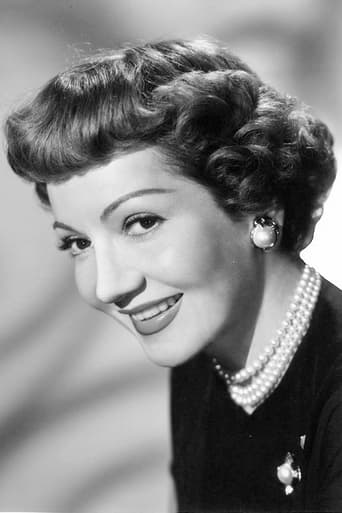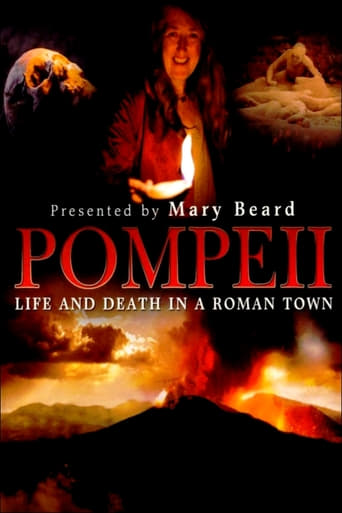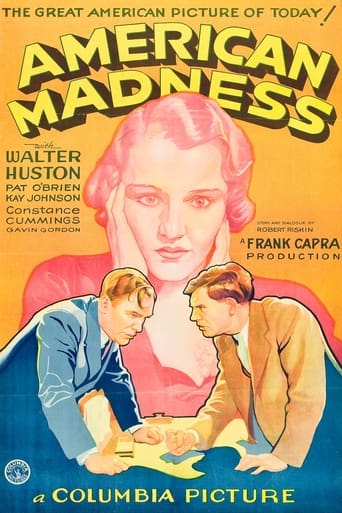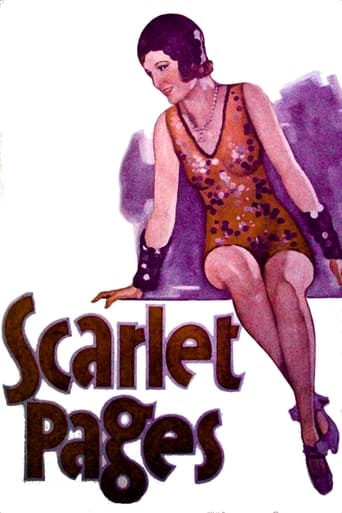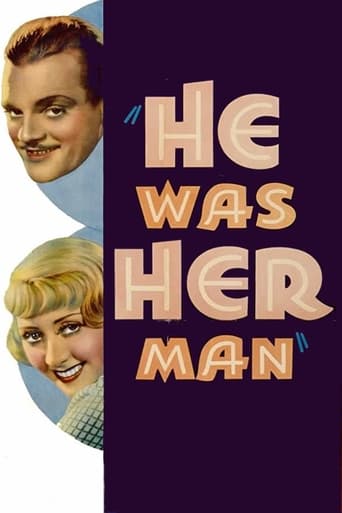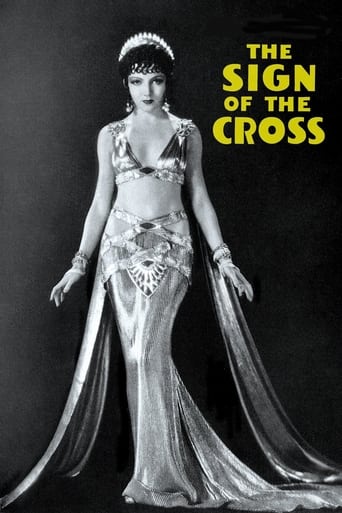
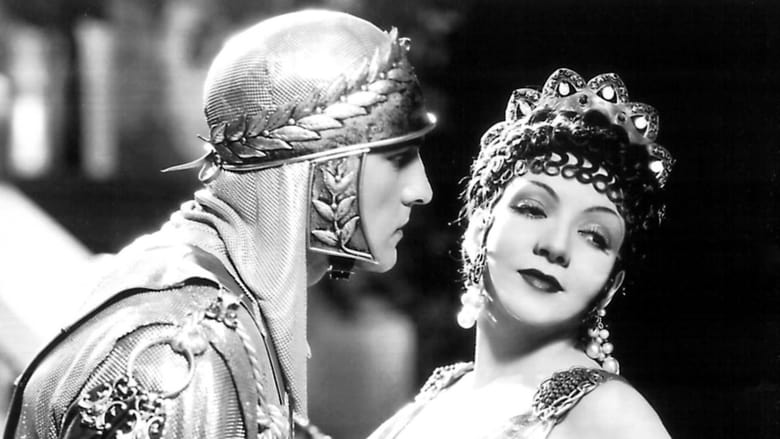
The Sign of the Cross (1932)
After burning Rome, Emperor Nero decides to blame the Christians, and issues the edict that they are all to be caught and sent to the arena. Two old Christians are caught, and about to be hauled off, when Marcus, the highest military official in Rome, comes upon them. When he sees their stepdaughter Mercia, he instantly falls in love with her and frees them. Marcus pursues Mercia, which gets him into trouble with Emperor (for being easy on Christians) and with the Empress, who loves him and is jealous.
Watch Trailer
Cast
Similar titles


Reviews
Very well executed
Load of rubbish!!
Wow! What a bizarre film! Unfortunately the few funny moments there were were quite overshadowed by it's completely weird and random vibe throughout.
Although I seem to have had higher expectations than I thought, the movie is super entertaining.
A pre-code epic by director-producer Cecil B. DeMille featuring one of my favorite actresses, Claudette Colbert in the famous milk bath scene, as well as the great Fredric March. It's near the end of the Roman Empire, Nero fiddles while Rome burns, and Christians are fed to the lions. Karl Struss received an Oscar nomination for his Cinematography. Another version of the story can be seen in Quo Vadis (1951).In 64 A.D., Marcus Superbus (March) is the great warrior of Rome who falls for Mercia (Elissa Landi), a Christian girl. However, Marcus is coveted by Poppaea (Colbert), the wife of Nero (Charles Laughton), who can influence the Emperor. Another with this ability is Tigellinus (Ian Keith), a warrior jealous of Marcus's power. Tigellinus asserts his influence over Nero to have the blame for Rome's burning blamed on the Christians, so that they can be rounded up and/or executed.Titus (Arthur Hohl) brings news from Jesus's disciple Paul, making the acquaintance of fellow Christian Favius (Harry Beresford) by making the "sign of the cross" on the ground. Nat Pendleton, a loyal Roman "thug", witnesses this as well as Marcus's saving of Mercia, Titus, and her father Favius, and reports it to Tigellinus. Meanwhile, the Christians are planning a big meeting for Titus's report, and Favius's son Stephan (Tommy Conlon) will be used to pass the secret location & time to others. However, he is captured (by Pendleton) and tortured by the Romans to reveal the information such that Tigellinus takes his troops to ambush and kill the Christians.When Marcus hears of this, he and men loyal to him rush to the scene, but are delayed by Poppaea, who is jealous of anything which draws him away from her. So they arrive too late to stop Tigellinus's slaughter of many of the Christians including Titus and Favius. The rest are imprisoned to later be fed to the lions, bears, alligators, and even crushed by elephants as entertainment for spectators in the Colosseum.However, Marcus has his second in command, Lecinius (William Mong), take Mercia to his home where she can be protected. There, she witnesses debauchery as he tries to get her to renounce her religion to be safe and live with him. She resists and instead tries to "save" him. There's a great dance sequence featuring Ancaria (Joyzelle Joyner) as she and Marcus's house guests try to corrupt Mercia. There's another scene in which Poppaea (with Colbert dressed to kill;-) tries to sway Marcus's favor, only to be rejected such that she uses her influence with Nero to have Mercia taken from his residence.I won't reveal the ending, except to say that it's both tragic and hopeful. Also, Charles Middleton plays Tyros, and Mischa Auer and John Carradine appear uncredited in this large production.
A lot of silly tosh but Claudette Colbert as Poppaea is a gorgeous little thing with a sassy mouth on her and Charles Laughton is WAY over the top. Laughton's Nero set the gold standard for Nero for all time. The two of them are so BAD and WICKED you'll laugh out loud with delight. They were obviously having a lot of fun. The 'early Christians' and their 'camp meetings' are a dreary bore and as always in these - the role of the Apostles is as thankless as can be with big Santa beards and robes and a lot of 'solemnity' . The arena slaughter is justly famous and is well worth finding in the uncensored version with the sexual sadism clearly illustrated in the spectator's lustful faces.I have always had a soft spot for Ancaria 'the wickedest woman in Rome' who has her 'lesbian song and dance specialty act' interrupted by hymn singing martyrs on their way to the arena. If you've ever been up-staged you will sympathize.Frederic March vacillates between tolerably good acting and intolerable ham.De Mille is in his element in the arena and at the orgy. Most of the rest of story creaks along. I give this 7 stars and 8 if you fast forward.
As the film opens in 64AD Rome, the city is burning and Nero (Charles Laughton) is playing his hand held harp. He comes up with the idea to blame all the social, political, and economic problems on the nascent Christians, some of whom who are old enough to have witnessed Christ's crucifixion. This leads to one of the better portrayals of the Colliseum "games" that's ever made it to the big screen and surely must have made Depression weary viewers forget their problems for the time being. The love story of the relationship between prefect Marcus Superbus (Frederic March) and the young Christian woman Mercia (Elissa Landi) seems like a distraction, though it was probably necessary to counterbalance the salacious depictions of debauchery, especially Claudette Colbert's bathing scene in milk brought to her by slaves, and a wild dance that goes on while the Christians sing hymns as they're being led to the Colisseum dungeon. I think Frederic March probably became great sometime after this film, but Laughton, who doesn't get that much screen time, is great as Nero the hedonist and also as a serious ruler. But what will surely capture attention is the finale, which goes on quite extensively, and which DeMille in pre-code fashion, let it all fly, while bringing an effective and moving human touch to the suffering.
Many of the comments refer to the Colosseum. This is an error made by movie makers themselves. There were other sites for games in the early Roman Empire. The building of the Colosseum was finished in 80 AD. Nero died in 68 AD. It is actually the Flavian Amphitheatre. It was built partially on the site of Nero's House of Gold. This infamous palace complex had a large lake. The Colosseum was build over the remains of the lake bed. The name Colosseum refers to a large statue of Nero which was in this complex. The persecutions under his reign most likely took place in the Circus of Caligula/Nero on the site of the present day Vatican.


